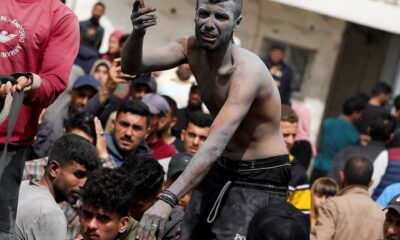Middle East
I have finally understood the true meaning of Land Day | Israel-Palestine conflict

When I was a school student, every morning, we would gather in the schoolyard and sing songs dedicated to our land, Palestine. Many of our classes would teach us about our culture and traditions deeply rooted in Palestinian land.
Every March 30, we would mark Land Day. Girls would wear embroidered dresses and boys would wear white shirts and keffiyeh. We would sing under a raised Palestinian flag and commemorate the Palestinian land struggle.
I fully realised the true meaning of what I was taught about this struggle only when I faced displacement from my home, when I faced the very real possibility of losing my land.
I was born and raised in the Shujayea neighbourhood on the eastern flank of Gaza City. It is a centuries-old neighbourhood, where farmers and traders settled. Over time, it became one of Gaza’s most densely populated neighbourhoods, known for its strong community ties and history of resistance. It is no coincidence that one of its most prominent people was Dr Refaat Alareer, a poet, a scholar, and my professor in English, who inspired me to write and resist.
My family has lived in Shujayea for centuries. They built home after home in the same area until they created a long street known as Mushtaha Street. This is not just a name; it is a testament to just how deep our roots run in this land.
We not only have our homes in Shujayea but also our farmland. I grew up playing on my grandfather’s olive grove, which he had inherited from his ancestors. The olive trees taught us how to love our land, and how to be steadfast like them.
I have never thought, even for a minute, of leaving my home, my neighbourhood. As a child, I never dreamed of living elsewhere, I wanted to stay where my ancestors had happily lived, to inherit the land, to tend to the olive trees.
The first time we had to flee our Shujayea was when Israel attacked in 2014. I was very young at that time, but I remember every single moment of our evacuation. I remember the missiles and shrapnel flying around and the sound of the screaming and crying. It was a traumatic experience, but throughout it, I was sure that we would soon return.
Then, it happened again almost 10 years later. Throughout the genocide, my family and I had to flee our home more than 10 times. The longest we had to stay away from our neighbourhood was three months. But we never went too far. Despite the extremely difficult conditions, we did not flee to the south; we stayed in the north.
Shujayea endured two invasions during this war, the first in December 2023, and the second in June 2024. The second came suddenly, without warning, on a summer morning while residents were still in their homes.
When the Israeli tanks reached Shujayea, they targeted markets and old restaurants, electricity poles and water pumps, levelling many areas until they were unrecognisable. The once-busy streets turned grey with destruction.
My family home was bombed and partially destroyed. My grandfather’s land was not spared either. The trees that stood for generations, that gave fruit countless seasons, were uprooted and burned.
The loss of his olive grove proved too much for my grandfather. Within three months of hearing the devastating news, he passed away.
Today, we face the prospect of being displaced once again. People from the eastern part of Shujayea have started fleeing under threats from the Israeli army once again. We do not know what is going to happen next. People are afraid but are still hoping there will be another ceasefire.
This year, marking Land Day carries a different meaning: Despite the continuing genocidal war, we are still here, we are still standing, and we are still holding on to the land that we inherited from our ancestors. We will not give up.
On this day, I remember Dr Alareer’s poem:
O, Earth
Hug me
And hold me tight
Or devour me
To suffer no more.
I love thee
So take me.
Make me rich.
Make me dirt.
Gone are the days of serenity.
Guns are the words of humanity.
I have no food but a thorn,
No sport but a sigh.
For a soldier needs to feel high.
O, Earth,
If in life I am to hurt
Let my dirt in you give birth.
O, Earth.
The views expressed in this article are the author’s own and do not necessarily reflect Al Jazeera’s editorial stance.
Middle East
Unpacking Israel’s war on international humanitarian law | Israel-Palestine conflict News
On March 24, Israel struck a car in northern Gaza and killed Al Jazeera correspondent Hossam Shabat.
The 23-year-old is one of countless civilians – men, women and children – Israel has killed since launching what legal scholars describe as a “genocidal” war on Gaza.
Israel often justifies its killings by claiming that the targets are people sympathetic or affiliated with Hamas or other armed factions. This was the justification given for killing Shabat.
Israel also regularly destroys entire neighbourhoods and buildings, killing dozens – often hundreds – at a time, ostensibly to target a single Hamas operative.
For years, Israel has tried to justify these practices by employing lawyers to create shadowy quasi-legal concepts in the hope of establishing new, dangerous precedents, according to legal scholars and experts.
However, legal scholars told Al Jazeera that neither so-called “targeted killings” nor disproportionate attacks against civilians have any grounding in international law.
“Is there any semblance of law or legal justification for the war tactics Israel is using in Gaza? The simple answer is no. There isn’t,” said Heidi Matthews, assistant professor of law at York University in Toronto, Canada.
Setting precedents
On September 28, 2000, Palestinians across the occupied West Bank and Gaza began demonstrating against Israel’s ever-entrenching occupation in what became known as the second Intifada.
Israel’s repression of the Intifada quickly prompted Palestinians to mobilise and fight back.
Over the next five years, Israel launched what it named “targeted killings”, assassinating unarmed Palestinians.
Israel claimed that these targets could pose a threat to Israelis in the future because of their alleged membership in an armed faction.
“Israel … strips protection from civilians based on their views or perspectives,” said Noor Kilzi, a researcher with Legal Agenda, a nonprofit in Lebanon that advocates for legal reform and human rights in the Middle East.

Israel’s concept of targeted killings laid out a blueprint which the United States adapted during its “war on terror”, analysts told Al Jazeera.
“[In the early 2000s] Israel and the US changed their legal doctrines and implemented that as part of their military dogma,” York University’s Matthews told Al Jazeera.
“When it came to distinguishing between civilians and combatants… the US and Israel began to view [anyone as a target] based on their membership to a group,” she added.
According to the International Committee of the Red Cross, a person is only a legitimate target if they are directly engaged in armed combat at the time they are killed.
This means that suspected membership in an armed group is not a sufficient basis to assassinate someone.
Leiber’s legacy?
Throughout Israel’s war on Gaza, it has routinely dropped 2,000lb (900kg) bombs in densely populated residential areas, as well as systematically targeted schools, hospitals and displacement shelters.
Israeli officials justify these attacks by claiming that Israel is fighting a “just war” against barbarians. As a result, the ostensible goal of destroying Hamas outweighs minimising civilian casualties.
This is rooted partly in the philosophy of Francis Leiber, a 19th-century German American military theorist, who was tasked with setting out the “rules of conduct” for Unionist soldiers fighting the Confederates in the US Civil War.
He argued that some wars are vital to the moral progress of civilised nations and require a quick victory, which can only be achieved using tactics that will likely cause huge civilian casualties.
“Leiber basically said that whatever is militarily necessary to carry out war is legal,” Alonso Gurmendi Dunkelberg, a legal scholar at the London School of Economics, told Al Jazeera.
This terrifying reasoning is blatantly at odds with international norms and laws, Gurmendi Dunkelberg added.
“He believed in killing as many people as you can, so that you finish the job quickly. He believed that was more humane than trying to protect people to the point that the war drags on for say 15 years,” he said.
Since the beginning of Israel’s war on Gaza, its spokespeople have made similar arguments.
Mark Regev, an adviser to Israeli Prime Minister Benjamin Netanyahu, said the goal was to “get the [war] done quicker” when asked by PBS about why Israel had dropped 6,000 bombs in the first six days of attacks on the besieged enclave.
Then spokesperson for the Israeli army, Daniel Hagari, also admitted during the first days of the war that the emphasis in Gaza was on “damage and not accuracy”.

Destroying the system
In November 2024, the International Criminal Court (ICC) approved two arrest warrants for Netanyahu and his then-Defence Minister Yoav Gallant – accused of using starvation as a weapon of war and deliberately attacking civilians in Gaza.
An earlier ruling by the International Court of Justice found that Palestinians in Gaza faced a real risk of genocide due to Israel’s war practices.
The rulings by the ICC and ICJ add weight to the argument that Israel has failed in trying to legally justify its war practices, which likely amount to multiple war crimes, crimes against humanity and even genocide.
As a result, Israel and its western allies are now trying to sabotage the very institutions that were created to uphold international law and prosecute perpetrators of atrocities, said Nadim Khoury, former director at Human Rights Watch and the founder of the Arab Reform Initiative think tank.
“Israel has clearly hit the limit of what they can get away with by using legal arguments. Now, they’re just acting with total impunity to undermine the institutions trying to enforce international laws,” he told Al Jazeera.
Several legal scholars and experts expressed dismay that Netanyahu may be able to visit countries in Europe that are parties to the Rome Statute, the legal framework underpinning the ICC.
Countries such as Hungary, Belgium and France have said they will not arrest Netanyahu if he visits their countries or passes through their land or airspace.
York University’s Matthews believes states that claim to uphold international law must act quickly to salvage what’s left of the system, acknowledging that it was never a perfect model.
“Other states – beyond America and Israel – need to take action to save or salvage the system as a whole, or it will fade away quickly,” she told Al Jazeera.
“We are at an inflection point and it doesn’t look good.”
Middle East
Netanyahu backs dismissal of Israeli reservists calling for end to Gaza war | Israel-Palestine conflict News

About 1,000 current and retired Israeli Air Force pilots sign letter, saying Gaza war only serves ‘political interests’.
Israeli Prime Minister Benjamin Netanyahu has denounced about 1,000 current and retired Israeli Air Force reservists, who signed a letter calling for an end to the war in Gaza, referring to them as “marginal and extremist”, while expressing support for the serving pilots’ dismissal.
In a statement posted on X on Thursday, Netanyahu’s office said the prime minister “backs the decision” of the defence minister and the Israeli military chief of staff “to dismiss those who signed the letter”.
The document, which ignited a political uproar in Israel, urged all Israeli citizens to demand an end to the war, warning that the bombardment of Gaza puts Israeli captives held in the enclave at risk.
“As has been proven in the past, only a [ceasefire] deal can bring back the hostages safely, while military pressure mainly leads to the killing of the hostages and the endangerment of our soldiers,” the soldiers said.
“Currently, the war serves mainly political and personal interests, not security interests,” the document added.
Netanyahu said “expressions that weaken” the military “and strengthen our enemies in wartime are unforgiveable”.
“This is a marginal and extremist group that is again trying to break Israeli society from within,” he added, accusing them of trying to topple the government. “They already tried to do this before October 7 and Hamas interpreted the call to refuse to serve as weakness.”
According to Israeli media, the letter does not call for a general refusal to serve but rather urges Israeli officials to prioritise the release of captives rather than pursuing the deadly war.
The Israeli newspaper Haaretz said the signatories include many active reservists, including senior officers and pilots, as well as others who are no longer in active reserve duty.
The report added that after the document was leaked, military officials called the signatories and urged them to retract, on orders from Israeli Air Force commander Tomer Bar.
Bar also threatened the reservist pilots who signed the letter would be barred from serving, according to Israel’s public broadcaster Kan.
Haaretz said only 25 retracted their signatures while eight more signed in protest.
The newspaper later reported that Israel’s Military Chief of Staff Eyal Zamir and the Air Force’s Bar have decided to dismiss the reservists.
It is unclear when the dismissal would take effect.
Critics have accused Netanyahu of prolonging the war in a bid to keep his cabinet intact and stay as prime minister.
Families of Israeli captives and their supporters have also been urging Netanyahu to reach a ceasefire with Hamas and pave the way for the captives’ release.
Gaza’s Health Ministry says at least 50,846 Palestinians are confirmed dead and 115,729 wounded in Israel’s war on Gaza. The enclave’s Government Media Office updated its death toll to more than 61,700, saying thousands of people missing under the rubble are presumed dead.
Middle East
Bombed-out Gaza university becomes shelter for displaced Palestinians | Gaza News

One of the Strip’s largest universities, the Islamic University of Gaza in Gaza City had about 17,000 students before the war, studying everything from medicine and chemistry to literature and commerce. More than 60 percent of the students were women.
But now, any sense that the place was once a university is gone.
After 18 months of Israeli bombardment that killed more than 50,000 people in the enclave, the main auditorium is a gutted, burned-out wreck. Giant holes have been blasted through its blackened walls. The banks of seats are mangled and twisted.
The campus has become a refuge for hundreds of families in northern Gaza since Israel broke a ceasefire on March 18 and relaunched the war.
Families have set up tents in lecture halls and classrooms. They take books from the library and burn them in cooking fires because they have no fuel. Children run around in gardens reduced to fields of debris and mounds of earth.
A makeshift market has been set up under the archway of the main gate.
Their struggle to survive has worsened because Israel has cut off the entry of food, fuel, medicine and all other goods into Gaza for more than a month, straining the limited supplies of aid agencies on which nearly the entire population relies.
-

 Education2 days ago
Education2 days agoDemocratic-led cities and states push back on threats to cut US school funding over DEI
-

 Sports1 day ago
Sports1 day agoJason Day will opt for ‘toned down’ Masters outfit as organizers check what he plans to wear at the tournament
-

 Lifestyle1 day ago
Lifestyle1 day agoWater bottles have an array of new designs and functions
-

 Middle East24 hours ago
Middle East24 hours agoAt least 35 killed in Israeli attack on Gaza residential block | Israel-Palestine conflict News
-

 Sports1 day ago
Sports1 day agoAurélio Pereira: Cristiano Ronaldo pays tribute as legendary Portuguese coach who scouted him dies aged 77
-

 Middle East1 day ago
Middle East1 day agoEight charts that reveal the economic impact of Trump’s tariffs | Donald Trump News
-

 Europe1 day ago
Europe1 day agoTrump’s top trade official says president’s tariffs are necessary to fix trade deficit ‘emergency’
-

 Conflict Zones1 day ago
Conflict Zones1 day agoChinese soldiers in Ukraine: Is Beijing sending troops to back Russia? | Russia-Ukraine war News



